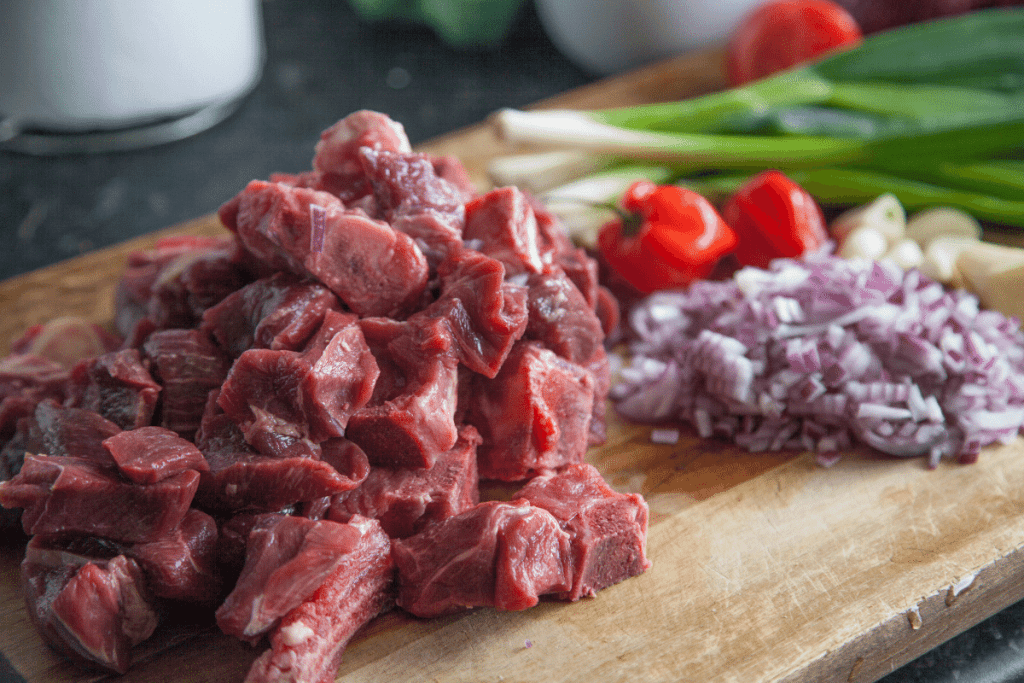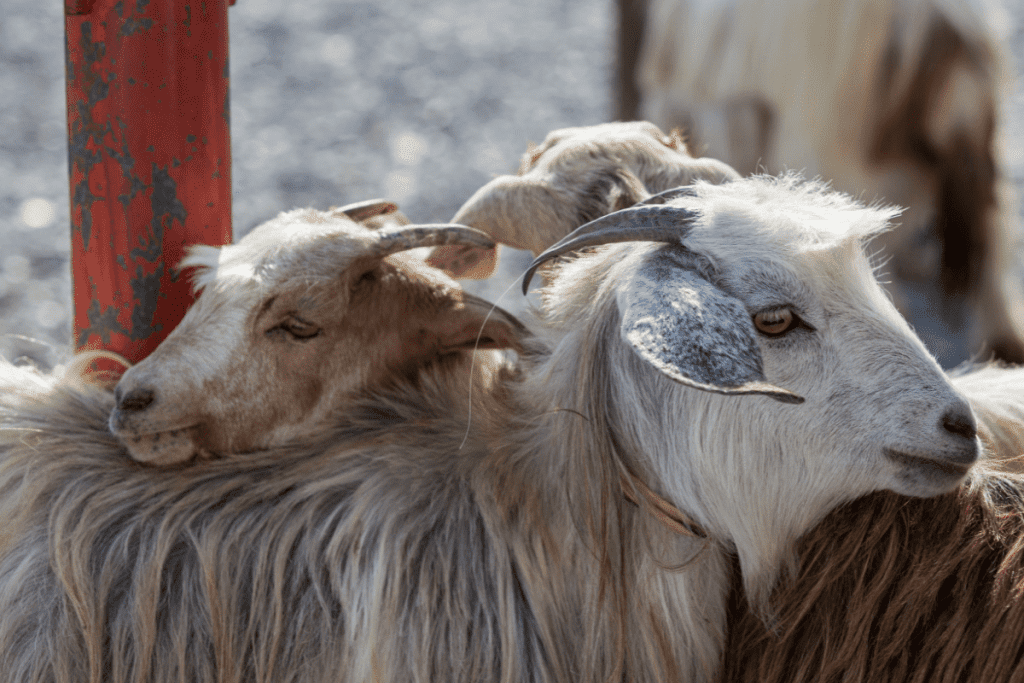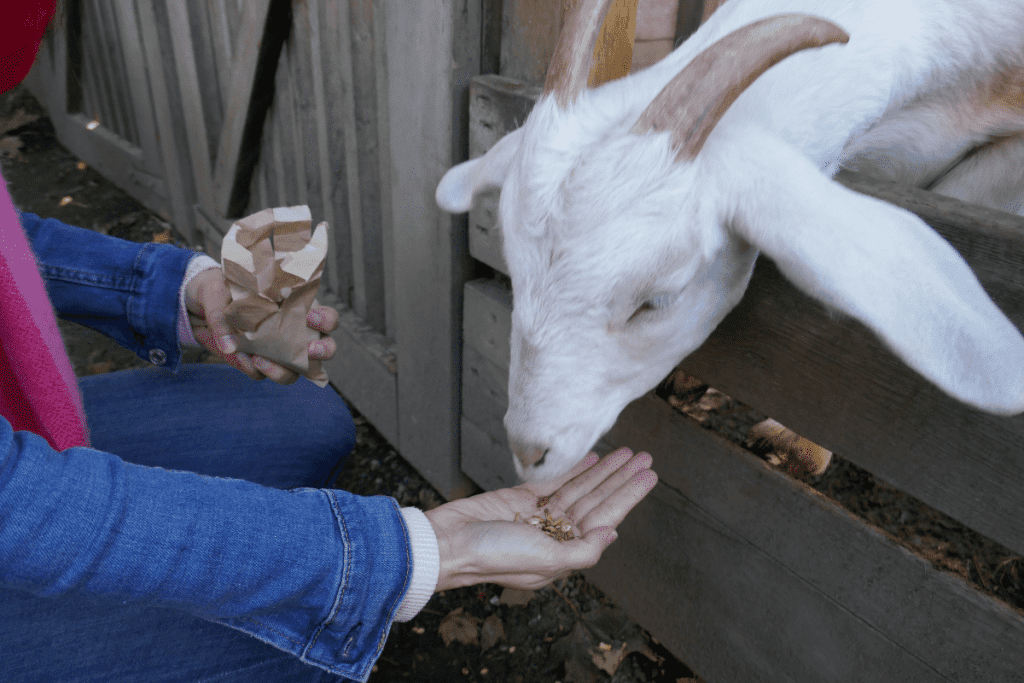Goat meat has been continually gaining popularity in the United States, especially in the growing Hispanic and Muslim populations.
As these ethnic groups increase, so will the demand for goat meat.
So if goat meat is becoming more popular, why is it so expensive?
Goat meat is expensive because goats have high nutritional needs, and raising goats requires a lot of space to prevent overcrowding. Goats also have a lower meat yield when compared to other animals commonly raised for their meat.
Since it is more challenging to raise goats when compared to cows or chickens, fewer farmers are raising them for meat.
As a result, the demand for goat meat is higher than the supply, which causes prices to soar.
Read on to learn more about why goat meat is so expensive and how it compares to the price of other meats.

Table of Contents
ToggleIs Goat More Expensive Than Beef?
Compared to most commercially-produced beef products, goat meat will always be more expensive.
However, raising cattle in the same way as a goat would make prices more comparable between the two types of meat produced.
It is impossible to raise goats in the same confined spaces as some cows.
For example, you might be able to fit seven cows in a corral, but you would only be able to have two goats in the same amount of space.
If you do not give goats adequate space, they will become stressed and develop health issues.
It may take a goat anywhere from seven months to one year before it weighs enough to be slaughtered.
Cows are not slaughtered until they are between one and three years old.
However, the amount of meat produced by a goat is much less than a cow makes.
A goat may only produce 40-50 pounds of meat, whereas a cow will have between 400-500 pounds when it is old enough to be slaughtered.
Because of this lower yield, farmers have to sell their goat meat for more money than beef.
There are also fewer goat farmers than cow farmers, and it is challenging for them to keep up with the increasing current demand for goat meat.
More than 30% of the goats we consume in the United States are imported from other countries such as Australia and Mexico.
The percentage of goat imports increases every year due to steadily rising demand.
Price Comparison Chart
The following table shows the price range comparisons for goats and more common meat sources.
The prices are per pound after processing.
More desirable cuts of meat, such as ribeyes and loin chops, will always be more expensive than flank steaks or ground meat.
| Type of Meat | Price Range Per Pound (After Processing) |
|---|---|
| Pork | $6-$7/lb |
| Chicken | $1.62-$3.73/lb |
| Beef | $4.45-$6/lb |
| Lamb | $8-$18/lb |
| Goat | $13.63-$18.24/lb for whole or half goat, $33/lb for better cuts |
How To Lower the Cost of Purchasing Goat Meat
Goat meat does not have to be prohibitively expensive for you to buy.
There are a couple of tips for getting goat meat at a better price.
Buy Meat From An Older Goat
Buying meat from an older goat is one way to get a lower price per pound of meat.
There are a couple of advantages to purchasing meat from an older goat, such as less fat and more flavor.
There will also be more meat on the carcass of an older goat.
The only downside to getting meat from an older goat is the meat may be tougher, but since it is more flavorful, it will work very well when slowly cooked for stews.
Buy A Goat To Have It Butchered
Another way to save money on goat meat is to buy a whole goat and have it butchered.
You will be able to store the meat in your freezer for 4-9 months for the best flavor, depending on the cut.
Larger cuts such as loins, steaks, and chops will keep longer in the freezer than ground or cubed goat meat.
The price range for an average meat goat is from $250-$300.
You will also have to pay for transporting the goat to the processing facility, usually around $25.
It may cost up to $90 to have the goat slaughtered, but the price may be closer to $40-$50 in some areas.
Butchers usually charge a price per pound of hanging weight for the goat, which is generally 50%-60% of the weight of the live animal.
The cost of butchering a goat includes cutting and wrapping the meat, so it is ready to go into your freezer.
If you purchased a goat for an average price of $275, then paid $25 for transport and $90 for the butcher’s fee, your total cost would be $390.
This price equates to just $11.82 per pound of goat meat, slightly below the average market purchase price.
Where To Buy A Goat?

If you decide to purchase a goat to have butchered, you need to know where to buy one.
You will typically get a lower price if you buy a goat at an auction, but it is recommended to research current market prices for goats before you go so you do not overpay.
If you are nervous about attending a livestock auction, you may have someone more experienced, such as an order buyer, do the bidding for you.
You will also be competing against other buyers at an auction, so make sure you stick to it if you have a set budget.
Buying a goat directly from a farm may cost you a little more, but you will usually get a higher-quality goat.
Farms are also a more relaxed environment, and you will have more time to ask any questions you may have about the goat.
Buying from a farm is also better if you look for goats to raise on your farm.
Research goat breeders in your area to ensure they are reputable and their goats are free from diseases or defects.
If you are unsure which questions to ask, bring someone more knowledgeable with you to help.
How Long Does It Take to Raise a Meat Goat?
Raising your goats for meat is a rewarding venture if you have the land and budget to do it.
Choosing a meat breed goat is essential because they will reach their slaughter weight faster than a dairy breed.
When selling a meat goat, the animal will be ready to sell when it is 6-7 months old.
For a larger-bodied goat with more fat layer, it will take up to one year before the animal reaches the desired weight.
A castrated male goat, more commonly known as a wether, will also take at least one year before it reaches market weight.
Related: How old is too old to castrate a goat?
You will need to factor in the extra expenses of feeding and caring for the goat for a longer period when compared to selling a goat with a lower weight.
Is There A Market for Goat Meat?
As previously stated, the United States imports over 30% of its total goat meat from other countries.
The number of imports has continued to climb every year due to the popularity of goat meat among ethnic consumers.
Increases in the Muslim and Hispanic population throughout the United States drive the higher consumer demand for goat meat.
There are not enough meat goat farmers in the United States to keep up with the increase in goat meat consumption, which causes higher prices for consumers.
Australia has the highest percentage of goat meat exports, with more than 50% of the world market.
China exports 12%, France exports 8%, and New Zealand claims 3.6% of the global market in goat meat exports.
The United States imports the highest percentage of goat meat at over 18%.
Due to the increase in the price of goat meat and the decrease of available farmland, more United States farmers are expected to switch to raising meat goats in the coming years.
Currently, Texas is the leading producer of meat goats, followed by Tennessee and California.
Cattle prices remain steady while the current market price for goats continues to climb.
More states are expected to increase goat production as the ethnic population increases throughout the United States.
Why don’t more people raise goats?

Since the goat meat industry in the United States is relatively new compared to other livestock, there are fewer commercial medicines for keeping goats healthy and free from disease.
An inexperienced farmer may not follow the proper vaccination schedule for their goats, causing viruses to spread quickly throughout the illness-prone herd before they are detected.
Special care must also be taken when dealing with pregnant goats to ensure the safety of the mother and kids.
Without proper treatment, the mother or her offspring could die very easily.
Even the most experienced farmers may have difficulty keeping their herds healthy if they do not have adequate land and resources.
Supporting fewer animals per acre means the livestock producer receives a lower profit.
It may also take a few years for a commercial goat herd to produce a profit for a farmer.
Many farms rely on selling a few healthy goats for breeding stock to recoup the money spent on raising them.
There are also fewer slaughterhouses dedicated to processing and packaging goat meat.
Goats are more easily stressed than beef cattle, and they require special handling before being slaughtered.
Many slaughterhouses do not have the proper equipment or training to process goats properly.
More education is needed for farmers and butchers to ensure successful goat meat production.
Keeping the pen clean is also a pain for some people.
Related: How often do you need to clean out a goat pen?
Commonly Asked Questions
What type of goat is better for meat?
Most breeds of goats will be suitable for meat, including dairy goats.
However, some meat goat breeds stand out among others for faster production.
The Boer is the most common meat goat breed due to its large size and fast growth rate.
A full-size Boer goat will weigh between 200 and 300 pounds.
Boers are also very hardy animals acclimated to various weather conditions, and they are more resistant to diseases and parasites.
They are also known for their fast reproduction, as they become sexually mature and ready for breeding as young as five months of age.
Related: How soon can a goat rebreed?
Nubian goats are another breed suitable for meat production, and they reach an average weight of 175 pounds.
The Nubian is also a dual-purpose breed, and it is frequently used for milk production.
Nubian goats are sometimes cross-bred with Boers to produce a herd of large, sturdy goats.
The Verata breed is an excellent goat for meat production because of its large size, and it will grow to 150 pounds.
Veratas are prolific breeders, but their large horns make managing a herd a bit more difficult.
Check out our article on goat horns and how much they grow!
What does goat meat taste like?
Goat meat has a slightly gamey but sweet flavor, and the texture is very soft and tender if the goat is young.
Compared to beef, goat meat is more savory and less sweet, but it is sweeter than lamb.
Older goats will have tougher meat, but this may be overcome by cooking it slowly to preserve adequate moisture and using the meat in a stew.
The flavor of goat meat will also be affected by how it is prepared and seasoned.
Goat meat is versatile and may be barbequed, stewed, curried, minced, canned, or fried.
Many people also use goat meat to produce a flavorful sausage.
Goat meat is a common staple in Mexican food, Jamaican stews, and curries.
Is goat healthy to eat?
Goat meat is a healthier alternative to more common meat animals.
It is nutrient-rich, naturally lean, and offers many health benefits.
Goat meat has less saturated fat, more iron, and the same amount of protein as beef, chicken, pork, or lamb.
The meat is also healthier than other types of meat because hormones are not approved for promoting growth in goats.
Goat meat is also rich in calcium, potassium, and vitamins B6 and B12.
How useful was this post?
Click on a star to rate it!
We are sorry that this post was not useful for you!
Let us improve this post!
Tell us how we can improve this post?
